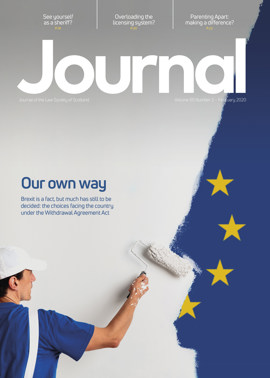Letters: February 2020
No need for Roberton
The Edinburgh Bar Association (EBA) would like to respond to the article by Professor Lorne Crerar (Journal, January 2020, 12). The EBA represents practitioners in all courts in Edinburgh. The majority of our members undertake legally aided work, mainly in criminal defence. The EBA's role as a representative body is distinct from that of the Law Society of Scotland. We do not accept the argument that the Society cannot or should not perform both representative and regulatory functions. The Society represents members, for example, in consultation with Government regarding reforms. It provides specialist knowledge about the law and the functioning of our legal system. It is not our trade union. We do not agree that representation of the profession is inconsistent with the regulation of its members. Perhaps it is a testament to the integrity of the Society that its Journal has led with an article so at odds with the Society's own position on the Roberton recommendation.
Professor Crerar seems largely to have focused on the position of large firms with headquarters in different countries and considerations of choice of jurisdiction. Our members come from small firms, hampered by the limits of legal aid funding. Having had to cope with exponentially increasing payments to the ill-conceived Scottish Legal Complaints Commission, the prospect of a fundamental redrawing of the regulatory landscape is alarming. The concerns of global firms should not drive the reform of regulation for all of us. Those same firms have offered little support to legal aid practitioners. In Edinburgh, we continue to witness people leaving the profession. We should not bear the cost of scrapping the current regime and starting anew.
Professor Crerar’s central argument that the decline in large firms located in Scotland is related primarily to the Scottish regulatory regime is puzzling. Those firms have adapted because of commercial imperatives, and the assertion that they have been troubled by the diminution of an independent Scottish legal identity is wholly unconvincing.
Perhaps the most constitutionally concerning aspect of the Roberton recommendations is the proposed “independent” regulator appointed by politicians. As an association, we agree that Scots law is part of our identity. The independence of the profession from state and political control is a long established tenet of Scots law. It is vital that solicitors defending those being prosecuted on behalf of the state should be independent of political control. Therefore, we cannot see that the recommendations of the Roberton review would help to nurture and protect Scots law.
The Law Society of Scotland is correct to fight to retain its internationally respected reputation as a regulator.
Julia McPartlin, President, Edinburgh Bar Association
DX problems
I wonder if any of your readers are experiencing the same problems with DX as I have recently. It was formerly the case that one could almost rely 100% on all items within Scotland being delivered the day after posting. However, increasingly this seems not to be the case, to the extent that I now always send out settlement cheques two days in advance.
I recently also had a letter containing important financial documents taking four days to reach its destination, and it arrived in a fairly dilapidated state.
I have now written two letters of complaint to DX asking for an explanation, but have had no response, not even an acknowledgment.
If this is the way DX are treating all their customers, perhaps it is time for a Rutland Mark 3.
Neil Cavers, Kirkcudbright






